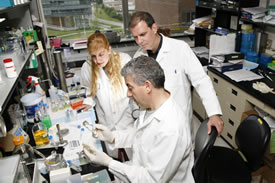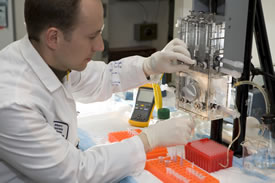FULL STORY
The Scientist Magazine Ranks Einstein One of the Best Places to Work
October 27, 2009 — (BRONX, NY) — Albert Einstein College of Medicine of Yeshiva University has been named one of the best places to work by The Scientist magazine. In the 2009 edition of "Best Places to Work in Academia, " Einstein ranked third out of 94 U.S academic institutions. Results are published in the November 2009 issue.

Ekaterina Dadachova, Ph.D., Arturo Casadevall,
M.D., Ph.D., Antonio Nakouzi (seated)This is the first time Einstein has ranked in the annual survey, now in its seventh year. Other institutions in the top five were Princeton University (1), University of California, San Francisco (2), University of Oklahoma Health Sciences Center (4), and Emory University (5).
"Faculty, students and staff at Einstein have always known what an exceptional community we have here, so it is rewarding to be recognized in this way," said Edward. R. Burns, M.D., executive dean. "Our expanding research facilities at Einstein and our strong collaborative environment continue to strengthen Einstein's enduring hallmark: to foster a rich and supportive atmosphere for scientists. I believe we were recognized this year by our faculty who have seen the amazing pace of new scientific recruitment while still valuing and improving services for our existing faculty."
Scientists from around the world have been recruited to fill 40 state-of-the-art laboratories in the Michael F. Price Center for Genetic and Translational Medicine/Harold and Muriel Block Research Pavilion. The five-story, $220 million Price Center/Block Pavilion represents the largest medical research facility to be constructed in the Bronx since the College of Medicine opened in 1955.
"Faculty, students and staff at Einstein have always known what an exceptional community we have here, so it is rewarding to be recognized in this way."
-- Edward R. Burns, M.D., Executive DeanThe recent expansion at Einstein is tied to a strategic research plan led by Allen M. Spiegel, M.D, the Marilyn and Stanley M. Katz Dean. The five-year plan was developed collaboratively by highly dedicated faculty to guide Einstein's research priorities.
The survey asked more than 2,350 respondents to rank their working environment according to 38 criteria in 8 different areas: job satisfaction, peers, infrastructure and environment, research resources, pay, management and policies, teaching and mentoring, and tenure and promotion. Those responding to the electronic survey identified themselves as tenured or tenured-track life scientists working in academia or other non-commercial research organizations.
Survey responders pointed to Einstein's research resources, and management and polices as key strengths.
"Since its founding, Einstein has promoted an interactive research approach that strongly encourages and supports research among investigators, breaking down traditional departmental barriers," said Harris Goldstein, M.D., assistant dean for scientific resources at Einstein. "Combined with easy access to shared facilities, which house a wide array of routine and cutting edge technologies, this highly collaborative environment has enabled the research programs of Einstein junior investigators to thrive and flourish."

Joerg C. Schlatterer, Ph.D."Einstein deans and staff have been dedicated to making the institution a world class academic medical and research institution," said Yvonne M. Ramirez, chief human resources officer at Yeshiva University. "To do that, special attention has been given to building and improving state-of-the-art facilities, technology infrastructure, support services, competitive compensation, benefits, and employment policies that encourage collaboration and research excellence. In addition to faculty, we have extended these benefits and policies to postdoctoral fellows, administrators, and support staff. We take pride in helping to make Einstein a great place to work that supports and rewards excellence."
Over all, survey respondents focused on collaboration, team building, and unique funding opportunities as important factors for job fulfillment in their working environment. The survey also ranked the top 10 international academic instructions, with the Max Planck Institute of Cell Biology and Genetics in Dresden, Germany earning the number one spot.
Among those surveyed, 47 percent of responders self-identified as working at a university, college or other non-medical academic institution; 23 percent reported being from a medical school or college; 15 percent from a research institute (non-profit, non-academic); 6 percent from a hospital; 5 percent from a government organization; and 4 percent from other.
The 2010 "Best Places to Work in Academia" and "Best Places to Work for Postdocs" surveys are now open online through November 24th, 2009.
Other Top Stories
9/11 World Trade Center Exposure Linked to Heart Disease Among NYC Firefighters
On Becoming a Physician: New Einstein Students Receive White Coats and Stethoscopes
Novel Therapy for Acute Migraine Shows Promise in Phase 3 Clinical Trial
First Complete Wiring Diagram of an Animal's Nervous System
Multimillion Dollar NIH Grant to Help Reduce Opioid Use & Get Care to People Who Need It
NIH Grant Funds $23 Million Study of Diseases Affecting People Living with HIV
New TAILORx Data Guides Adjuvant Therapy in Younger Breast Cancer Patients
Einstein Celebrates Its 61st Commencement
Bolstering Biopsies: Testing Patients' Individual Cells to Guide Treatment



Tablet Blog